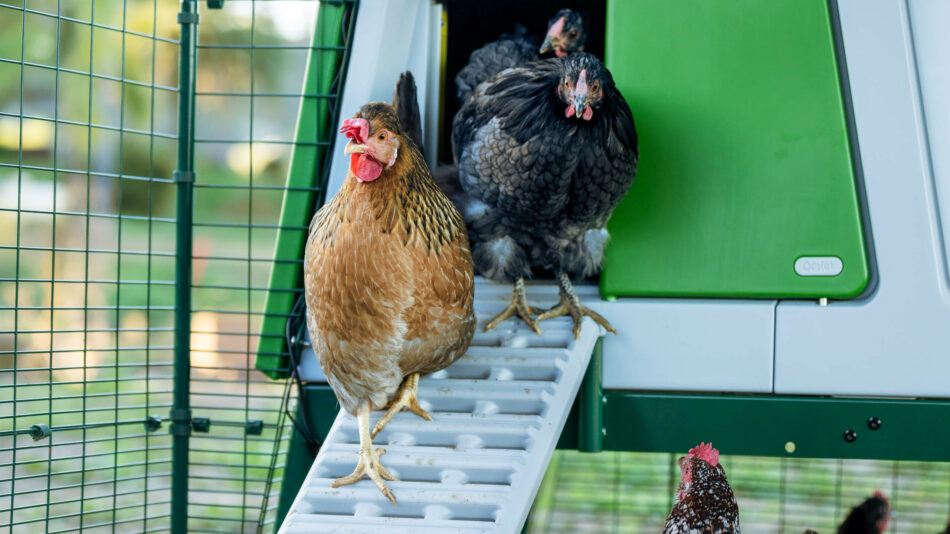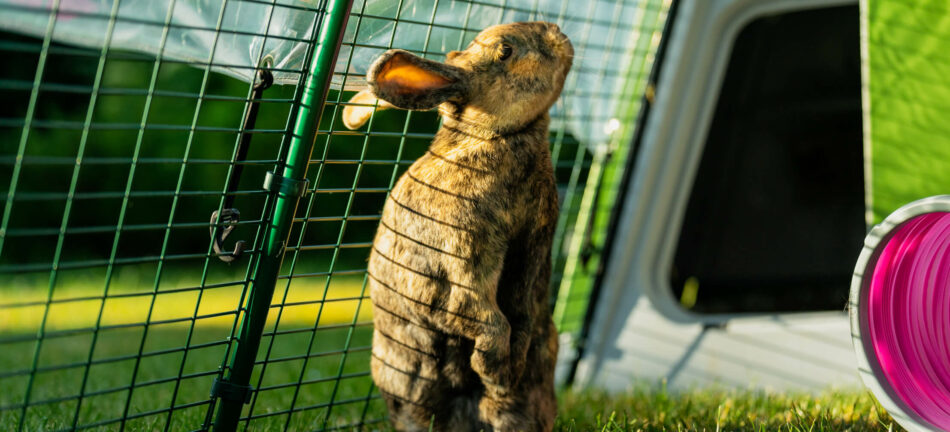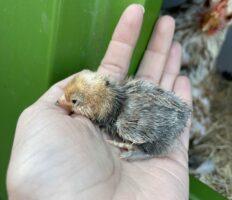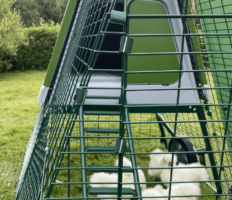Want to keep chickens and rabbits together?
Are you thinking you might want to keep chickens and rabbits together? These two outdoor-loving pets actually share several similarities, and can live in harmony as long as their individual needs are met. Chickens and rabbits have shared barnyards across the world for generations, so with a little preparation and planning, you’ll be able to keep both in your backyard. Discover how to keep these two species together, and what to expect along the way.
Chickens and rabbits together
Both chickens and rabbits are very social animals that enjoy spending time with others of their own kind, their owners, and even each other. Chickens and rabbits require about the same amount of space, and their ideal temperatures and the amount of care they require is similar. One large area with dedicated spaces for their own food and lodging is ideal for keeping fur and feathers together.
But there are a few things to think about if you’re considering keeping rabbits and chickens together – just putting them together in a chicken run or rabbit run without dedicated areas would be a mistake. We’ll share our top tips for how to help your flock and fluffle share a harmonious existence.
Introduce them early
You are more likely to succeed if you start introducing the animals to each other when they are young, so that they are raised together. But no matter which age they are, you’ll need to start by keeping them on different sides of a fence or a run so that they can get used to each other. Omlet’s partitions for the Outdoor Pet Run are perfect to create this separation. When they’re ready to spend time face-to-face, keep them in a very large enclosure, so that no one feels threatened by the other species. Make the enclosure gradually smaller, until they are all in the run where you are planning to keep them permanently.
Watch for signs of trouble
Your chickens might try to peck the rabbits while they are getting used to their fast movements. This doesn’t hurt a fully grown rabbit, and should pass after a few days. Never put a very young rabbit in with a flock of adult hens, as they are much more vulnerable. If your rabbit hasn’t been raised with the chickens from chicks, make sure your bunny is at least 4 or 5 months old before making introductions. If you notice tufts of fur being pulled out, or distress calls coming from your rabbit, remove them right away.
Different dwellings
Chickens and rabbits have very different sleeping habits. Chickens will roost overnight, while rabbits will seek shelter at ground level. Having their own sleeping quarters will also prevent chickens from depositing their droppings on unsuspecting rabbits during the night. Your chickens should have their own hen house, and bunnies should have a rabbit hutch to retire to at the end of the day, or when they’re overstimulated.
Dietary requirements
While chickens and rabbits can share fresh produce and certain treats, the bulk of their diet is very different. Chickens require layer feed, while rabbits need pellets that are lower in protein that are composed primarily of timothy hay. They’ll happily sample each other’s feed, but this can cause digestive upset. To prevent this, make sure your chicken feeders are out of reach of your rabbits, and that your rabbits are fed inside of their hutch, or in a separate area that they can access via Zippi Rabbit Tunnels, which are not accessible by most chickens.
Rabbits are tidy
Rabbits are well known for their cleanliness. They strive to eliminate in the same place each time, and they will meticulously clean themselves with their tongues and paws. Chickens on the other hand don’t maintain a reputation of tidiness. They’ll drop their eliminations wherever they are at the moment – which will not impress your rabbits. Thankfully, Omlet’s chicken coops, chicken runs, and rabbit hutches are all easy to clean, so you can keep their shared space tidy with minimal time and effort spent.
Make sure there’s room
Having two species in one place might be space efficient on the whole, but make sure the run is big enough and equipped with toys and hiding places to entertain and calm your pets. The Caddi Treat Holder is a perfect food toy for both rabbits and chickens to share fresh produce, and Zippi Play Tunnels are a perfect small den for a tired bunny.
Safety in numbers
Since chickens are flock animals, and rabbits live in groups, they need the company of the same species. Always keep at least two rabbits together – even if they’re with your chickens. Rabbits groom each other, sleep together, and speak the same language, so it’s important to have a pair of bunnies. Neutered males, spayed females, or one of each are usually the most successful pairings. Male rabbits kept together should always be neutered to avoid territorial displays, including those made toward your chickens. Similarly, roosters in a flock of chickens will defend the hens, which may mean displays of aggression toward rabbits. When keeping chickens and rabbits together, avoid having a rooster in the mix.
Omlet and your mixed flock
We’ve designed chicken coops and rabbit hutches to be not just practical and functional, but enjoyable. By combining your chickens and rabbits together in a shared space, you’ll be able to enjoy the company of each of them without sacrificing time with the other. In a large outdoor pet run, you can create the ultimate spot to spend time with your chickens and rabbits, and benefit from the interaction that different species have to offer each other – humans included.
This entry was posted in Chickens






One reply on “Want to keep chickens and rabbits together?”
Chicken feed is toxic to rabbits and can cause GI stasis and death. This practice shortens their lifespan and really isn’t ideal. This practice is also not recommended by vets. If you don’t have the space for rabbits, just don’t get them. Rabbits like clean spaces and can be litter trained, chickens just poop constantly, not really an environment a rabbit would ideally choose. I love my chickens, I love my ducks and I love my rabbit. I have them in environments that best reflect their individual needs as species. Rabbits make much better indoor pets than outdoor. If keeping them for food, it’s much safer to keep them away from the diseases chickens can have, plus you have much better control of their health and dietary needs. Rabbits are very likely to spread worms to chickens due to their digestive system as well.